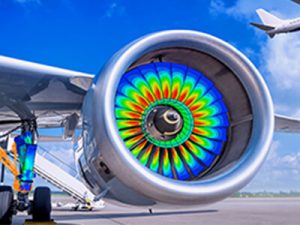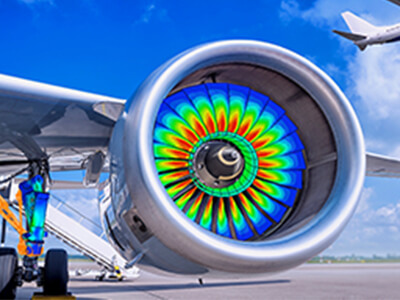Registration is now open for the TURBOMACHINERY: A TRUE MULTIDISCIPLINARY ENGINEERING CHALLENGE virtual event series on December 1 -3, 2020. This series will describe how SIMULIA’s comprehensive portfolio provides value to turbomachinery development from conceptual design to customer delivery. Key points that will be addressed include reducing the risk of innovation and the occurrence of late-stage failures by employing simulation, using simulation to reduce expensive prototype testing, and establishing the digital thread from requirements to design, to manufacturing, and product delivery.

Turbomachinery is a vital aspect of things we regularly take for granted, such as airplane engines and gas turbines producing electricity. Important as it is, however, the turbomachinery industry – like most other industries – has suffered due to the COVID-19 pandemic. Drastically fewer people are flying currently, and the air travel sector is scrambling to compensate. The setback is only temporary, however, assures Christophe Kleinclaus, SIMULIA IPS Aerospace and Defense Industry Process Senior Manager.
“Coming from different key companies, we do see is that the recovery will be done within two to four years,” Kleinclaus says. “So this means that by 2024 we should see again pre-COVID travels and pre-COVID situations in terms of production in industry in aerospace and defense.”
It may seem like a long time, but the aerospace and defense industry is so vital that it will survive, no matter what – and that means that the turbomachinery industry will survive. The strain created by COVID, however, means that the pressure will be on engine manufacturers to deliver new engines on time and, even more importantly, at targeted cost.
Reducing costs and time does not mean cutting corners, though. Safety will always be paramount in engineering and manufacturing aircraft components, so engineers look into new approaches like additive manufacturing software to produce parts with the requested quality. Adding further pressure are increasing environmental and noise-reduction regulations.
“So 75% reduction in CO2, 90% in reduction in NOx emissions and 65% reduction in noise,” Kleinclaus explains. “Looking at the roadmap highlighted to achieve those ambitious goals for air transportation, more than half of the developments focus solely on engine technologies. So they’re not only going to high bypass ratios, but as well going to open rotors and other more futuristic architectures, to achieve those very high settled goals that we can see here.”
The challenges that manufacturers and engineers face can be addressed through simulation, and Kleinclaus states that SIMULIA has best-in-class solutions to handle them.
“Engine…safety comes first and all is done to provide as much safety for the passengers and travelers as possible,” he says. “…Be it fan containment simulation, be it turbine blades crack propagation and discs…we have a very good toolset here that provides overall very good results and can to some extent help each and every engine maker to generate enough simulation to guarantee the safety and eventually reduce their structural tests and test beds and test prototypes down the line and eventually reduce costs as well.”
Predicting noise before running an engine test is “quite tricky,” Kleinclaus says, but SIMULIA has a unique flow simulation portfolio that can both predict and reduce noise in the critical takeoff and landing phases of an airplane. This portfolio can also address operability and environmental concerns, and will continue to do so into the future as engines shift into hybrid and electrical models. Hybrid and electrical engines may be an option for smaller planes or shorter routes, Kleinclaus predicts, if not for larger aircraft.
“All engine makers are right now looking into some alternate architectures, and therefore the engine market and the proportion market in general for aircraft will be very scattered between different approaches…local travelers might be more hybrid while long travelers might keep the standard approach or the current architecture of the engines, which is quite efficient,” he continues.
Kleinclaus believes that these changes will push engine manufacturers and engineers to use even more digital solutions and the cloud to limit the inherent risk of implementing innovative concepts. Engines are highly complex and require a multidisciplinary approach, he adds, including flow, structure, thermal and electromagnetic simulations.
“This is where the SIMULIA portfolio and the CATIA portfolio shines,” he says. “So we do not concentrate only on one area or one discipline when it comes to simulation, but the full portfolio is really the key for advancing into the next generation of aircraft and aircraft engines. SIMULIA has a unique toolset that can provide all those things, and not only those separate disciplines and simulation possibilities are there, but you can all merge them into the platform. In five to 10 years from now, we will have all those wonderful tools integrated in one specific place, where results and inputs and data management will be handled through the pre-design phase towards the detailed design, and eventually as well towards the tests and support certification process, we will have everything provided in a consistent manner in the platform.”
Learn more about simulation in the turbmomachinery industry here. Also check out more of our expert interviews in the Our Values playlist on YouTube.
SIMULIA offers an advanced simulation product portfolio, including Abaqus, Isight, fe-safe, Tosca, Simpoe-Mold, SIMPACK, CST Studio Suite, XFlow, PowerFLOW and more. The SIMULIA Community is the place to find the latest resources for SIMULIA software and to collaborate with other users. The key that unlocks the door of innovative thinking and knowledge building, the SIMULIA Community provides you with the tools you need to expand your knowledge, whenever and wherever.
